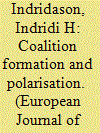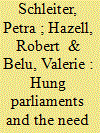| Srl | Item |
| 1 |
ID:
105709


|
|
|
|
|
| Publication |
2011.
|
| Summary/Abstract |
Party ideology plays an important role in determining which government coalitions form. Research on coalition formation tends to focus on the ideological distance between coalition parties. However, the distribution of preferences within the coalition, and the legislature, also has implications for which government coalition forms - that is, a party's willingness to join a coalition depends not only on its prospective coalition partners, but also on the alternative coalitions it could form. Several hypotheses about the effects of legislative polarisation are offered and tested using data on coalition formation in 17 parliamentary democracies in the postwar period. This article also demonstrates how the traditional measure of ideological divisions within coalitions fails to capture certain aspects of ideological heterogeneity within the cabinet (and the opposition) and how Esteban and Ray's polarisation index helps in addressing these deficiencies.
|
|
|
|
|
|
|
|
|
|
|
|
|
|
|
|
| 2 |
ID:
155410


|
|
|
|
|
| Summary/Abstract |
The general elections of 2017 and 2010 produced hung parliaments in which no single party could command an overall majority; in May 2015 the UK only narrowly avoided that outcome. When a parliament is hung, more than one potential government can be viable, and the constitutional rules that determine who has the first right to form the government can thus have a decisive influence on which government forms. In the past, the UK has applied several potentially contradictory rules (based on conventions and principles), which do not all follow an equally democratic logic. This status quo is problematic because it can generate political controversy and uncertainty, in addition to jeopardising the Monarch's role in the government formation process. A reform that enables parliament to elect the leader who will be tasked with the formation of the next government would resolve these problems and provide constitutional clarity.
|
|
|
|
|
|
|
|
|
|
|
|
|
|
|
|
| 3 |
ID:
085456


|
|
|
|
|
| Publication |
2008.
|
| Summary/Abstract |
This study considers whether and to what extent defections from a government coalition are punished. The study employs data on coalitions in eastern and Western Europe from 1950 through
2006. The results show that if a coalition breaks due to conflict between partners or if one party withdraws from it, subsequent inclusion of the conflicting parties in the same coalition becomes less likely. Additional tests demonstrate that this effect occurs because defectors are punished by their former Coalition partners. Another extension of the main analysis shows that rather than becoming pariah parties, defectors lose credibility only in the eyes of their former coalition partners.
|
|
|
|
|
|
|
|
|
|
|
|
|
|
|
|
| 4 |
ID:
106952


|
|
|
|
|
| Publication |
2011.
|
| Summary/Abstract |
This short comment seeks to clarify what unipolar politics as usual is, and how it differs from politics as usual under alternative systemic conditions, especially bipolarity. This is an assessment 'from within', accepting Brooks and Wohlforth's description of unipolar politics as well as their central premises that America's lonely superpower status faces no immediate threat and that there is little evidence that powerful states are actively seeking to overthrow the current unipolar system. I suggest that a comparative assessment of how alternative distributions of power create different incentive structures for states yields different conclusions and policy prescriptions than those advanced by Brooks and Wohlforth. Most notably, Brooks and Wohlforth do not fully appreciate how the 'unipolar politics as usual' that they describe provides states with few incentives to cooperate with their policy prescription that the US reshape the world's institutional architecture.
|
|
|
|
|
|
|
|
|
|
|
|
|
|
|
|
| 5 |
ID:
103990


|
|
|
|
|
| Publication |
2011.
|
| Summary/Abstract |
Ministerial portfolios are the most obvious payoffs for parties entering a governing coalition in parliamentary democracies. This renders the bargaining over portfolios an important phase of the government formation process. The question of 'who gets what, and why?' in terms of ministerial remits has not yet received much attention by coalition or party scholars. This article focuses on this qualitative aspect of portfolio allocation and uses a new comparative dataset to evaluate a number of hypotheses that can be drawn from the literature. The main hypothesis is that parties which, in their election manifestos, emphasise themes corresponding to the policy remit of specific cabinet portfolios are more likely to obtain control over these portfolios. The results show that policy saliency is indeed an important predictor of portfolio allocation in postwar Western European parliamentary democracies.
|
|
|
|
|
|
|
|
|
|
|
|
|
|
|
|